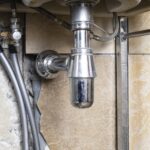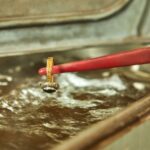Clogged bathtubs may seem like an inevitable annoyance in any household, but what if you could tackle this common problem without relying on harsh chemicals? Not only can you protect your plumbing, but you can also maintain a healthier home environment while being kinder to the planet. Let’s dive into some effective, natural solutions that will keep your drains flowing smoothly.
- Understanding how natural remedies like baking soda and vinegar can break down tough clogs provides a chemical-free approach to plumbing maintenance.
- Discover an easy, step-by-step guide on using everyday household items to safely and effectively resolve stubborn clogs.
- Adopt simple preventive measures to maintain clog-free pipes and avoid future plumbing headaches.
- Embrace eco-friendly practices that reduce chemical use, benefiting both your household and the environment.
By exploring these natural solutions, readers can achieve a clog-free, healthier bathroom environment and contribute to a more sustainable lifestyle. Dive into the article for comprehensive insights and practical tips that will transform your approach to household maintenance.
Understanding How to Fix a Clogged Bathtub Without Harsh Chemicals: Natural Solutions
Bathtub clogs are a frequent issue in many households, often caused by a mix of soap scum, hair, and other debris accumulating in the pipes. While it might be tempting to reach for commercial chemical drain cleaners, these products can have adverse effects on both your plumbing system and personal health.
Using natural solutions to fix a clogged bathtub is not only beneficial for your pipes but also ensures a safer environment for your home. Chemical drain cleaners often contain harsh substances that, over time, can corrode pipes, leading to more significant plumbing issues. They also release toxic fumes that might affect the indoor air quality and pose a health risk to your household members and pets.
Opting for natural, chemical-free methods helps maintain the integrity of your plumbing and avoids these health hazards. Moreover, embracing these eco-friendly practices contributes to environmental sustainability by reducing the amount of toxic chemicals entering our water systems. By understanding the causes of bathtub clogs and the advantages of using natural solutions, you can achieve an effective and healthier approach to plumbing maintenance.
The Science Behind Natural Solutions for Clogs
Natural ingredients like baking soda and vinegar are not only common household items but also powerful agents in tackling clogged drains. The science behind these natural solutions revolves around their chemical reactions and ability to break down various materials contributing to clogs.
Baking soda, or sodium bicarbonate, is a mild alkaline compound that dissolves dirt and grease. When baking soda is mixed with vinegar, which is an acid, a reaction occurs that produces carbon dioxide and water. This effervescence helps to agitate and break apart the stubborn buildup within your pipes, effectively dislodging clogs.
In addition to their clog-busting effectiveness, these natural ingredients are gentle on your pipes, making them a superior choice over harsh chemicals. They provide an eco-friendly alternative that is both cost-effective and readily available, allowing you to maintain clean and efficient plumbing without exposing your home to harmful substances.
Eco-Friendly Benefits of How to Fix a Clogged Bathtub Without Harsh Chemicals: Natural Solutions
Choosing to fix a clogged bathtub without harsh chemicals offers numerous eco-friendly benefits. One significant advantage is the reduced environmental impact. Traditional chemical drain cleaners often contain toxic substances that can harm aquatic life when they make their way into waterways. By opting for natural solutions like baking soda and vinegar, you contribute to cleaner water systems.
Additionally, using natural solutions for clogged bathtubs enhances indoor air quality. Many commercial drain cleaners release volatile organic compounds (VOCs) that can be harmful when inhaled. Natural alternatives eliminate this risk, ensuring that your home remains a safe and healthy environment.
Another benefit is the preservation of your plumbing system. Harsh chemicals can corrode pipes over time, leading to costly repairs. In contrast, natural solutions are gentle on your plumbing while effectively breaking down clogs.
Adopting these eco-friendly methods also supports sustainable living practices. By minimizing chemical usage, you contribute to a reduction in the production and disposal of toxic substances. This, in turn, lessens the carbon footprint associated with manufacturing and waste management.
Embracing natural solutions not only helps fix clogged bathtubs but also promotes a sustainable lifestyle. By making this environmentally conscious choice, you can enjoy a cleaner home and a healthier planet. Consider sharing these eco-friendly methods with others to spread awareness and encourage a more sustainable approach to home maintenance.
DIY Tips on How to Fix a Clogged Bathtub Without Harsh Chemicals: Natural Solutions
When faced with a clogged bathtub, turning to natural solutions offers an eco-friendly and effective remedy. You don’t have to rely on harsh chemicals to clear clogs. Instead, you can use everyday household items that are safe and easy to find.
Step 1: Gather Your Materials
You’ll need common items like baking soda, vinegar, and a kettle of boiling water. These natural ingredients are powerful allies in unclogging drains.
Step 2: Clear Out Any Visible Debris
Before applying any solutions, remove any visible debris from the drain. This could include hair or soap scum that might be blocking the drain cover.
Step 3: Use Baking Soda and Vinegar
Pour a cup of baking soda directly into the drain. Follow this with a cup of vinegar. The mixture will fizz and bubble, which is a natural reaction that helps break down the clog. Allow it to sit and work its magic for at least 15 minutes.
Step 4: Flush with Boiling Water
After the baking soda and vinegar have settled, carefully pour a kettle of boiling water down the drain. The hot water will help clear any remaining residue and wash the remaining debris through the pipes.
By using these natural solutions, you can effectively clear most bathtub clogs. This method not only helps protect the environment but also ensures your indoor plumbing remains in great condition.
Preventive Measures to Avoid Future Clogs
Keeping your bathtub drain clog-free is about more than just addressing blockages as they occur. Implementing a few simple preventive measures ensures that those pesky clogs remain a thing of the past.
Regular Clean-Up
Make it a habit to clear away hair and soap residue after each bath or shower. This will significantly reduce the chance of these substances accumulating and causing a clog over time.
Install a Drain Cover
Using a drain cover or screen is an effective way to catch debris before it has a chance to enter your pipes. Regularly clean this cover to ensure optimal performance.
Rinse Your Drain Weekly
Once a week, pour hot water down the drain. This simple practice can help break down potential buildup and maintain a smooth flowing system.
By adopting these preventive habits, you can enjoy a hassle-free, clog-free bathtub for years. These measures not only save time and effort but also support a more sustainable household environment.
Frequently Asked Questions About Natural Solutions for Clogged Bathtubs
What are common causes of bathtub clogs?
- Hair buildup
- Soap scum
- Mineral deposits
- Foreign objects
How does baking soda and vinegar unclog drains?
The chemical reaction between baking soda and vinegar creates pressure and agitation, helping to break down clogs.
How often should I clean my bathtub drain naturally?
It’s recommended to use natural cleaning methods monthly to prevent clogs.
What are the benefits of using natural solutions for clogs?
- Safe for plumbing
- Environmentally friendly
- Non-toxic for your family
Can natural methods remove severe clogs?
For tough clogs, natural solutions may need to be repeated or combined with mechanical cleaning tools.





